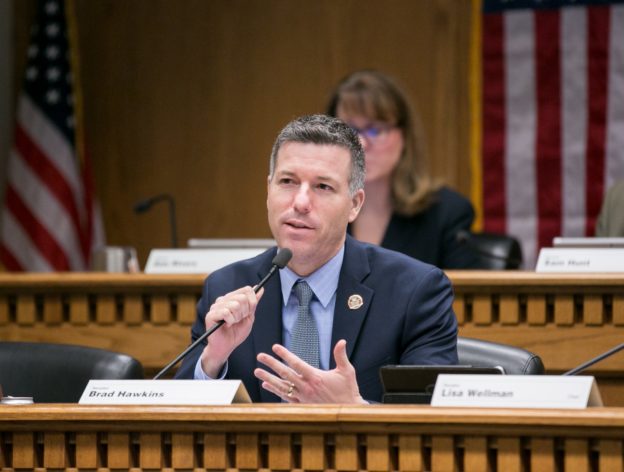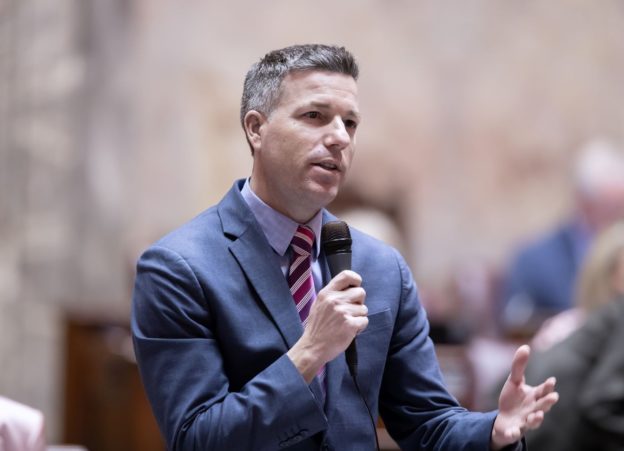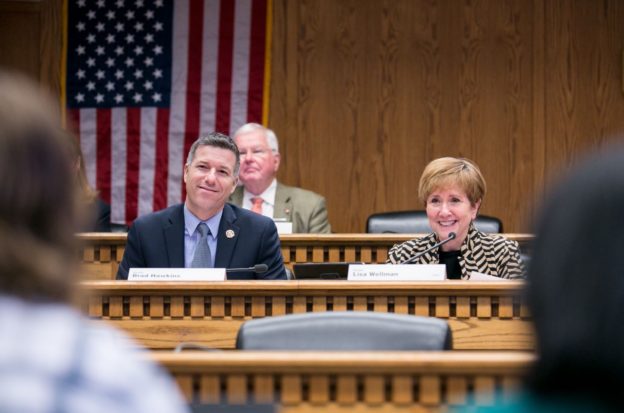Sen. Brad Hawkins on the KOZI Morning News talking about budgets, education mandates, initiatives, the timing of bills, working with his seatmates in the House, redistricting, and more. #waleg
Tag Archives: education
A bill sponsored by 12th District Sen. Brad Hawkins to modernize the Running Start Program has taken a key step forward. Senate Bill 5670, allowing 10th grade high school students to participate in online college classes, was approved today by the Senate Ways & Means Committee.
Hawkins’ bipartisan bill was unanimously approved earlier in the session by the Senate Higher Education and Workforce Development Committee, a new committee for Hawkins this year. Senate Bill 5670, as amended in the committee, allows 10th graders to participate in one college course per quarter, if the class is entirely online.
Created in 1990, Running Start is a popular tuition-free “dual credit” program in Washington state that allows high school juniors and seniors to earn college credits while also working toward their high school diplomas. State funding that follows the student is shared between the K-12 school districts and higher education institutions.
Hawkins believes the rationale for only allowing 11th and 12th graders in the Running Start program when it began over 30 years ago had to do with lawmakers likely not wanting to mix high school and traditional college students on campus. Considering how institutions structure classes for Running Start students and the rise of online only classes, Hawkins says it’s time to modernize the program.
“Many classes at community colleges are almost entirely high school students participating in Running Start so allowing sophomores who are academically ready to explore a limited number of online classes would be a very good thing,” Hawkins said.
Hawkins added, “You need to walk before you run, so I call my bill a walking start to Running Start.”
His bill directly aligns with state goals related to post-secondary attainment, which involves students earning credentials beyond a high school diploma. Hawkins said, “Many juniors and seniors work really hard to earn a two-year community college degree by the time they graduate from high school, which can be both overly stressful and impact their social opportunities.”
“Many students work really hard but don’t quite earn their college degree by the time they graduate from high school, yet they never go back to finish due to tuition cost and life circumstances.” He added, “My bill would allow 10th graders to chip away a bit at their two-year degree online and position them better to complete their college program.”
Senate Bill 5670 now heads to the full Senate for consideration.
As the Legislature readies itself for multiple weeks of upcoming floor debate on hundreds of bills, Sen. Brad Hawkins is troubled by the mandates in Senate Bill 5462, which would require all school districts in the state to adopt an “inclusive” curriculum.
“The big issue I have with this proposal is the forced adoption of more Olympia-based curriculum by all school districts in the state,” said Hawkins. “This reminds me very much of the highly controversial ‘comprehensive’ sex education bill that was mandated upon every district just a few years ago.”
In 2020, Senate Bill 5395 was approved in the Legislature after much debate on nearly 200 House and Senate floor amendments. The bill, which Hawkins voted against, was eventually approved and was signed into law. After the governor signed it, citizens gathered enough signatures to create a referendum, which failed on a statewide vote in November 2020. During the intense floor debate in 2020, Hawkins’ amendment allowing families to opt out their children was one of the only amendments approved and signed into law.
For Senate Bill 5462, Hawkins will propose an amendment that “allows rather than requires” school districts to adopt the state-developed policies directing inclusive curriculum. It also removes requirements in the bill that apply to public charter schools. While Hawkins had success with his floor amendment in 2020, he is not as optimistic with this year’s Senate Bill 5462 amendment, saying, “The votes are not likely there to significantly change the statewide mandates this bill proposes, but I’m going to try.”
Hawkins added, “Lawmakers in Olympia need to allow our locally elected school boards to make more decisions for their communities, especially related to curriculum. Our whole school governance system was once predicated on local control and now it seems that the Washington State Legislature wants to become the ‘Washington State School Board.’”
Following a challenging school year for students, parents, and schools and anticipating significant learning loss across Washington state, 12th District State Sen. Brad Hawkins has introduced bipartisan legislation aimed at reforming “outdated” school year calendars that leave students with nearly three months each year with no school instruction.
Hawkins, the ranking Republican member on the Senate’s Early Learning and K-12 Committee, is sponsoring Senate Bill 5147 to explore alternative school calendars. His lead co-sponsor is 41st District Sen. Lisa Wellman, who chairs the committee and works closely with Hawkins on education policy.
As proposed, the bill would create opportunities for up to 50 school districts (30 from western Washington and 20 from eastern Washington) to voluntarily participate in year-round school. In Hawkins’ bill, school districts selected to participate in implementing alternative school calendars would receive an additional 30 days of funding beyond the 180 days that the state currently provides. The bill also includes financial incentives for districts seeking to spread their existing 180 days over a 12-month school calendar. If this program works well, the Legislature could consider expansion to all schools in future years.
Hawkins says reforming the school calendar is long overdue. “The school calendar that most districts use is rooted in an agrarian economy where families needed children to take long breaks in the summer to assist with farming. That no longer makes sense, and a change is long overdue,” says Hawkins.
“Now is the time – following this pandemic – to think big about reforming the system and to get serious about addressing the learning loss of our students. Long summer breaks, requiring significant reteaching in the fall, is the last thing our kids need in the years ahead. I hope a program that encourages lawmakers and districts to consider transformational reforms will be thoughtfully discussed and debated,” says Hawkins. “Our students deserve that.”
“Through no fault of the educators, students, or parents, there has been learning loss this year and often during summer breaks for many students. This is the perfect time to explore options about how we can recover from learning loss. We need to keep all our options on the table to give our students all that they need,” says Wellman.
The bill will be referred to the Early Learning and K-12 Committee, where it is expected to receive a hearing early in the session. Hawkins and Wellman look forward to receiving testimony and public input. The 2021 legislative session began Jan. 11 and is scheduled to last 105 days.
(CAPTION: Ranking Republican member Brad Hawkins (12th District) and Chair Lisa Wellman (41st District) of the Senate’s Early Learning and K-12 Education Committee are teaming up to address student “learning loss” by exploring alternative school calendars in Senate Bill 5147.)














